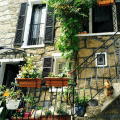One of my favorite France vs. USA list posts on my blog is the one from a couple of years back titled 77 Little things that are different about life in France. Since you seemed to like it, I’m back today with a few more things that fall into that category. Here we go!
OK, let’s get into a list of random things about life in France that are different from how things are done in the U.S. As I always say, nothing I write here is a judgment about France or the U.S.’s way of doing things. They’re different countries and it’s only normal that things are done differently. You can decide what you personally prefer. 😉

In the U.S., people think of these when you say M&Ms. The regular ones in the brown package.
1. Peanut M&Ms are the standard M&Ms. In France, when people talk about M&Ms, they’re referring to the peanut ones in the yellow packaging. If you go to McDonald’s and ask for an M&M McFlurry, the M&Ms that are mixed in are the peanut ones.
French grocery stores do carry the regular chocolate M&Ms without peanuts in the brown packaging, but the go-to when people talk about M&Ms is the peanut variety.
Here’s where to buy the best French foods online in the U.S. if you need a fix of all things yummy.
2. The census doesn’t collect data on ethnicity or religion. In the U.S., it’s normal to tick off a box for your ethnicity, religion, and other personal data. In France, it’s definitely not.
France has about 35,000 municipalities and while all of them partake in the census, none of them collects data on residents’ racial makeup, religious practices, etc. It’s actually forbidden by law to do so.
3. Friday the 13th is a lucky day. In France, it’s a positive thing and there’s even a special lottery jackpot for the occasion. That’s not the case in the U.S. and Western superstition in general, though. Friday the 13th is a day to watch your back and is a very unlucky day that is said to have biblical origins.
The next one is in January 2023… If you’re superstitious, avoid cracks in the sidewalk and black cats… unless you’re in France. In that case, play the lottery because luck will be on your side!
4. TV license tax. If you have a TV in France, you have to pay a fee of 138 euros. Well, that was the case until 2022 anyway. This sort of fee is common in a bunch of countries but not in the U.S.
When I first moved to France, a guy came around at night looking in people’s windows from the street in search of the dead giveaway, that blue glow from the TV. If so, you were billed. If you were a student or below a certain income level, you may have been exempt but generally speaking most people paid this tax which went to funding the services provided by Radio France and France Télévisions.
These days, the fee is lumped into local taxes and doesn’t exist anymore, but the first time we got the bill, I was so confused.

Life is so hard without you, my love. Here she is at her 10th birthday party.
5. Pets are not registered with the health department. When we got Dagny (who sadly passed away March 5, 2022), I asked Tom where we submit her proof of vaccination and officially register her with the town. He didn’t know what I was talking about.
As it turns out, unlike some areas of the U.S., France doesn’t require you to register your pet with your town’s health department, pay a fee, and provide proof of a rabies vaccine. I don’t want to give France any ideas since taxes are already steep.
That said, your pet has to be microchipped and tattooed.
6. Coffee comes after dessert. When out to eat in France, if you order dessert and coffee, the coffee generally comes after you’ve finished dessert. If you want to drink your coffee with your dessert, you’ll have to specifically ask for it to be brought at the same time.
No worries, though, if you ask for it at the same time. It’s not a faux pas (read those here!). It’s just an uncommon request since the French wait to drink coffee — usually an espresso — until after they’ve finished dessert.
At U.S. restaurants, if you order coffee and dessert, they usually come together.
7. Crustless bread. As a kid, I’d always save the crusts on my sandwiches until the end, but not for the trash! They were my favorite part of the sandwich! You know, the whole save the best for last and all. I know a lot of kids (maybe adults too?) — in both the U.S. and France — don’t care for the outer edge of their sandwich bread and France has a solution.
They actually sell bread without any crusts at all. Right next to all the other sandwich bread, grocery stores sell neat little squares of crust-free bread and it’s mainstream and easy to find.
Harrys came out with it in 2004 and calls it 100% mie. It’s the perfect choice for kids or anyone else who doesn’t want any pesky crusts. Neat, eh? I can’t say I see this much, or ever, in American supermarkets. Anyone else want an all-crust bread? I’d buy it.
11 Ways French and American grocery stores are different >>
8. Punctuation like a question mark and exclamation point come after a space. Punctuation is a little different in France and you may have noticed this one if you do any reading in French. In a sentence that ends in a question mark or exclamation point, there’s an extra space just before.
Let me give you an example. See what I mean ? I can’t believe it ! In English, we’d just write, see what I mean? No space before the question mark. FYI, colons and semicolons follow the same rule.
9. School dances and sports teams aren’t a thing. French public schools don’t have prom, marching band, sports teams, or a special graduation ceremony. If kids excel in a sport or want to pursue an extracurricular activity beyond general physical education class, that’s something they organize and pay for on their own.
There are also no school-hosted dances in French schools. American rites of passage like prom and homecoming are not part of French culture and there’s no French equivalent. I’ve found that schools have less of a community feel in France and more emphasis is put on academics. Again, not necessarily a bad thing but a difference in cultures.
It’s always interesting to hear what teens think of popular American shows that depict aspects of American culture that don’t exist in France.
Shows like Friday Night Lights that revolve around a Texas high school’s football team wouldn’t exist in France because high schools don’t have sports teams. There’s no JV or varsity football, wrestling or any of the other norms we’ve grown up with in the U.S.
American social norms that do NOT translate to French culture >>
10. Maternity leave is a minimum of 16 weeks long. Soon-to-be mothers in France are entitled to 16 weeks off work with pay, which breaks down to six weeks before birth and another 10 after. It’s longer if you have twins, if there are complications, or if it’s your third child.
Paternity leave breaks down as follows: Four days of mandatory leave right after the birth and then 21 additional days within the next six months. Adoptive parents also get leave (a little bit shorter though). Remember, this amount of paid leave is what’s given by law and is not a perk of working for a great company.
In the U.S., it might surprise you to know that companies are under no legal obligation to offer paid parental leave or any leave at all, although good companies do and package it as a benefit. The Family Medical Leave Act (FMLA) covers up to 12 weeks of unpaid leave but is only an option for those who work at a company with at least 50 employees.

In case you don’t know what a Speedo-style suit is…. sorry, I couldn’t help myself. 😉
11. Men can’t wear board shorts or loose swim trunks at public pools. If you’re going to swim in France, be sure to get your Speedo ready! I’m not joking.
At French public pools, the dress code is strict for hygiene reasons. Men are required to wear Speedo style suits (or slightly more conservative ones that are like tight shorts) and cannot wear loose swim shorts.
The thought process behind the rule is this: They don’t want there to be the possibility of dirty street clothes being worn to swim. So to be sure everyone’s in a swimsuit meant for the pool, men are required to change into the aforementioned Speedo.
That way, it’s clear that everyone is wearing a swimsuit and not shorts they’ve worn around all day before coming to the pool. Here’s more on the public pool experience in France.
***
P.S. Want to read even more about cultural differences? I have a whole bunch of France vs. USA posts on topics like customer service, my favorite mealtime habit, social norms that don’t translate, French kitchens, homes, gyms, how Vaseline is used, pharmacies, going to the doctor, and more.
Oh, and let’s not forget electric kettles. I’ve come to love my electric kettle (it’s something I never owned until I moved to France) and use it daily like a good French wannabe.
P.P.S. Oct. 4, 2022, marks one year since my mom passed away. I plan on publishing a post that day (UPDATE: Here it is) on how things are now that a year has gone by.
Many of you have said that my grief posts have helped you in some way so I want to write something at the one year mark. But if you’ve been following the grief conversation, you probably know how things are going. Experiencing multiple losses in a short time period is something I wouldn’t wish on my worst enemy. I’m stressing about what I should or shouldn’t say. Hopefully I’ll finish a post worth reading. 😉
P.P.P.S. If you’re traveling to France and want to be more prepared, I have an eGuide titled “75 Beginner France travel tips for a standout trip.” Check it out!
PIN IT:










Hubby loves those peanut M&Ms! You are so right, when he talks about his love for M&Ms, he only means the peanut ones. Ugh, that TV tax…and I’m learning to enjoy coffee after dessert, sometimes I even look forward to it!
Love your posts, they always make my day brighter. Keep writing and posting, and don’t worry about how you say things or what you say – your posts are always worth reading and you are a treasure.
Thank you!
So glad you enjoy my content, Johanna! Means a lot. Thank you.
Hi, Diane. I always enjoy your posts – especially since Hubby and I are moving over shortly to the Pau area. I laugh out loud when I think of my honey wearing a speedo but, fortunately for him, he’s not a pool guy!
I was reading this post and somehow clicked on a link to the IG picture of you wearing the wrap-around dress by the Canadian designer (when you were on your Norwegian cruise?). When I clicked the link to go to her page it didn’t work. I copy/pasted it into Safari and saw it has an extra ‘.’ in the URL and once I removed that, I was able to get to her page. Thought you might want to correct it.
Glad you enjoyed the post! And thank you for the heads up about the link. I will take a look… Just so I understand, are you saying the broken link is on her page on Instagram or a link on my own blog?
My 77 year old Rochefortais husband of 41 years usually sneers at the “American impressions of French life” videos, but found all of your observations spot on. He binge watched the all yesterday afternoon. We live in the US, but, in general live a French life as to tv, food, meal schedules, child raising, etc. and have spent many summers making the trip to France to visit relatives. Your keen observations and comments brightened our day.
Awww, that’s great to hear. Thanks Karen!!!!
Hi there are a lot of teachers that read and talk about your blog. So I read this story today. I have to say I am jealous of you being in France. I was there over the summer cycling on the Loire, and I loved it. I was my first time back since 06, and should have tried harder to stay when I was there teaching!! I look forward to perusing more of your blog.
Thanks for stopping by, Ryan! So happy that teachers have found my work to be a good resource 🙂 Hope you get to visit again soon!
I love this post! I’ve been to France a few times and plan an extended visit next year. For this, I’m brushing up on my French and reading blogs to learn about culture differences that I’m not aware of. This post fit the bill. Peanut M&Ns! Men in Speedos! Thanks so much.
You’re very welcome. Thanks for stopping by, Elaine.
> If kids excel in a sport or want to pursue an extracurricular activity beyond general physical education class, that’s something they organize and pay for on their own.
Yes and no.
Secondary schools do have a sports association whose staff is essentially the PE teachers from that school. However, since this is extracurricular, attendance is voluntary, in contrast to PE.
There are also a variety of sports activities organized by local governments (MJC) or associations subsidized by local governments.